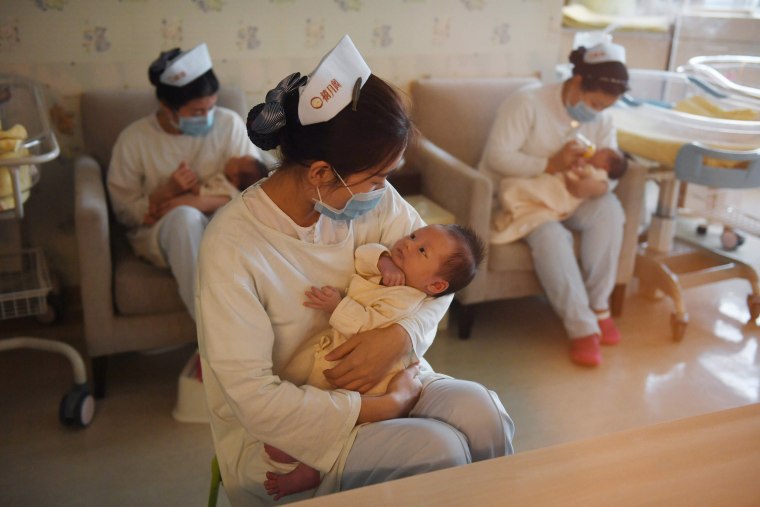BEIJING — Despite having the largest population of any country in the world, China isn’t having enough babies.
That’s the unspoken conclusion of a government plan, published Wednesday, which revealed that the relaxation of China’s one-child-only policy has so far failed to boost the country’s birth rate enough to avoid significant demographic challenges in the coming decades.
The easing of the one-child policy, which was amended in early 2016 to allow all Chinese families to have two children, helped push the number of births in the country to 17.86 million in 2016, an increase of 7.9 percent over 2015, according to state media reports citing China’s National Health and Family Planning Commission. The figure was the highest since 2000.
Other data released by China's National Bureau of Statistics recorded a slightly higher figure of 18.46 million births in 2016.
Despite the increase, China’s fertility rate remains below replacement level — at which a population naturally replenishes itself from one generation to the next — where it has languished for years, according to the National Population Development Plan 2016 - 2030, issued by China’s State Council, the country’s cabinet.
Despite state media trumpeting the increase as evidence of the two-child policy's success, the increase in births is lower than the figure of 20 million for which authorities had hoped — and even that figure would not have allowed the country to sidestep the demographic train rolling toward it.
"After 36 years under the one-child policy, a lot of urban couples have already adapted into this one-child culture”
The report released Wednesday warns that China faces a turning point over the next 15 years, particularly between 2021 and 2030. The aging of the population will accelerate, increasing pressure on social security and public services. At the same time, the working-age population will shrink, damaging economic growth and reducing the tax income required to support the elderly.
The report predicted that a quarter of China’s population will be over 60 in 2030, compared with about 16 percent in 2015.
Conversely, the working-age population — those aged between 15-59 — will be 80 million fewer in 2030 than in 2015, according to a statement Wednesday from China’s National Development and Reform Commission, cited by the Wall Street Journal.
The report predicts China’s population will peak in 2030 at 1.45 billion. It stood at around 1.37 billion in 2015.

Experts suggest that China’s demographic crisis is in part a legacy of its attempt at population control through the one-child policy.
“In traditional Chinese culture, more children meant more prosperity, so the traditional household would hope for more children, but the one-child policy has played a role in affecting that,” said Jieyu Liu, deputy director of the China Institute at London’s School of Oriental and African Studies.
“This recent change to the one-child policy is mostly affecting urban populations," she said. "Since the 1980s, rural households were allowed to have a second child if their first was not a son. I think that after 36 years under the one-child policy, a lot of urban couples have already adapted into this one-child culture.”
People with whom NBC News spoke this week on the streets of the Chinese capital expressed concern about the challenges facing parents in China.

Liu Wei, a 27-year-old Beijing resident and mother of a 14-month-old girl, said she was hesitating over having another baby.
“Raising a child is very expensive," she said. "My daughter just had an ordinary cold and we have already spent about $1400 for several days of treatment.”
“If the couple are both working, no one would be there to take care of the baby at home,” said Wu Fan, 31.
The shop-owner added: “Another reason is expensive housing, especially in Beijing. I plan to have our baby this year, but whether I will want to have a second child I am not sure yet.”
All those with whom NBC News spoke on the streets of Beijing this week cited finances as a major obstacle to either having either a first or a second child. Concerns about China’s notorious air pollution were also raised.

Experts also told NBC News that low levels of parental leave — four months for women and two weeks to nothing at all for men — along with a lack of affordable child care have diminished parents’ desire for a second child.
So, can China’s ruling Communist Party fix the problem? Experts suggested the government will struggle to effect meaningful change.
“The bottom line is that this is a very hard area to have any impact on. It’s mostly about public attitudes,” Professor Kerry Brown, director of the Lau China Institute at London's King’s College, told NBC News.
Related: China’s Hunger for World’s Food Grows, and U.S. Farmers Are Glad
“Trying to have campaigns encouraging people to have bigger families, it’s very limited what you can do," he said. "The economic constraints on people in China are very great. It’ll probably have a very limited impact, whatever the government does. It’s about creating the right mood music as it were.”
Despite China’s baby deficit, the country has resisted calls from some activists to abandon restrictions on the number of children families can have.
The government's population plan says the environmental carrying capacity, food and water supplies, energy production and the ability of medical and public services to cope would be stretched by too great an increase in population.
For the time being, however, such concerns remain hypothetical.
“The problem," Russell said, "is that many families are just not having many children — period.”
Mark Hanrahan reported from London